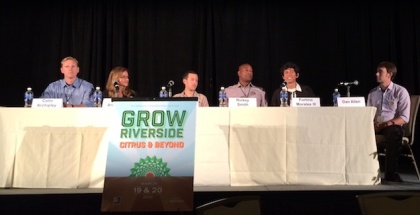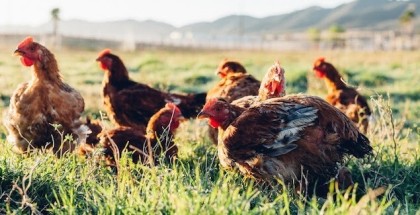Despite Current Dysfunction in the Food System, Renowned Agroecology Expert Holds Out Hope for Future
May 10, 2016 | AJ Hughes

Stephen R. Gliessman, Alfred E. Heller Professor of Agroecology in UC Santa Cruz’s Environmental Studies Department, shares his thoughts regarding the state of the food system. Photo courtesy University of California, Santa Cruz
What is the state of the nation’s food system? Is it fundamentally broken and beyond repair? Does it need to be changed, and if so, how? What is it doing right?
To address these questions, we reached out to Stephen R. Gliessman, an internationally recognized leader in the field of agroecology, and the Alfred E. Heller Professor of Agroecology in UC Santa Cruz’s Environmental Studies Department, where he has taught since 1981. He was the founding director of the UCSC Agroecology Program (now the Center for Agroecology and Sustainable Food Systems) and is the author of the renowned and pioneering textbook Agroecology: The Ecology of Sustainable Food Systems. In 2008, Gliessman became the chief editor of the internationally known Journal of Sustainable Agriculture.
Here is what we learned:
What is the state of the food system?
The current state of the food system is unhealthy. There is too much emphasis put on the business of growing food rather than long-term stewardship, care for the earth, and the people who grow food. That, I think, is a more important part of what’s going on. It’s amazing what the current food system is able to produce in terms of calories, but it’s also amazing in terms of what it doesn’t produce in terms of healthy nutritious food.
Does the food system work?
It depends on how you look at it. For the people in charge of the current food system, those who control it and gain profits from it, it’s working quite well. But for all of the young people and small farmers and consumers who would like to support an alternative agriculture, it’s not working very well. So you could say on one side it’s broken, but for the folks who are in charge, it’s not broken at all.
What is currently good about the food system?
There have been some pretty remarkable efforts to try and reduce the ecological footprint of food systems by making them less dependent on outside non-renewable inputs to lessen their negative environmental impacts. Regulations and controls, along with greater awareness, has grown considerably—I think that’s a step in a positive direction. At the same there has been a growing awareness amongst consumers of their need to support an alternative agriculture through their food dollars by visiting farmers’ markets, by going to markets that sell local produce. And, a broader re-localization movement is occurring in agriculture right now. I think this is a very important step.
What key changes are necessary for the food system to become more effective?
I see two primary changes. The first one is to develop a direct relationship between the people who grow the food and the people who eat the food. Another way of saying this, I like to think, is to put the culture back into agriculture—it’s more than just agribusiness. The other piece would be a whole different policy environment to support sustainable agriculture. This could range from the research side at USDA to the lobbying and international development arena of our government. The policy approach needs to distribute the power concentrated in food systems back to the people who grow the food and the people who eat the food.
What obstacles stand in the way of a great food system?
The question is: How do we overcome the private interests, the corporate interests, and the large-scale interests that control the food system right now—both financially and politically. They set policy and yield an incredible amount of power. We do need to start bringing the voice of the people back into the process to counteract and create an alternative to those strong voices—that’s what really needs to happen. This is going to take a lot of work, starting at the grass roots and working out to communities throughout the country and world to the point where there’s a critical mass that can scale up and bring about real change in policies. This is what needs to happen.
Is there hope for food system transformation?
Definitely. The experience I’ve had working with communities and community-based approaches to alternative agriculture tell me there’s a movement out there—a real populist movement that’s creating the alternatives, that’s creating the momentum that’s going to push in the direction of change and make the current system obsolete. I’m very hopeful that this will happen.
This post originally appeared on Seedstock.com: http://seedstock.com/2016/05/10/despite-widespread-dysfunction-foods-system-expert-remains-hopeful-for-positive-change/













Submit a Comment